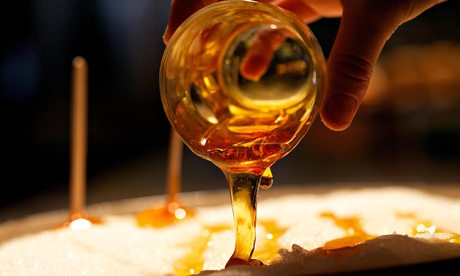
Caroline Cyr is pointing out the security features installed to protect Quebec’s new “global strategic reserve facility” in Laurierville. The small village, which lies in a maple tree-covered snowscape off the main highway between Montreal and Quebec City, is home to the world’s biggest reserve of its kind – for maple syrup.
An 8ft-high fence and security system surrounds the reserve. Visitors must tap in a code to gain access. “We have exterior cameras,” says Cyr, pointing to the building’s extensive CCTV system. She is the spokeswoman for the Quebec Maple Syrup Producers Federation. For Cyr, maple syrup is “really emotional”: she has worked alongside her father and grandfather making the sweetener. “We are filming everything, night and day,” she says proudly.
The producers – responsible for nearly 75% of the world’s supply of maple syrup – keep a vast back-up in a 235,000 sq ft warehouse. The reserve was established more than a decade ago to ensure the syrup, which is harvested in mid-winter, is available all year round. The warehouse, known as la forteresse du sirop d’érable – or the maple syrup fortress – has bank-like security features.
Inside, 18m kg of syrup are stored in 63,000 white barrels stacked five high in dozens of rows. The warehouse, which is alarmed, would not be out of place in a James Bond film. At its peak, the reserve, which includes two satellite buildings, can hold up to 33m kg of the elixir.
Canadians take their famous syrup for granted. Traditionally used to drench pancakes and waffles, it is also in great demand for other uses – to make salad vinaigrettes, as a seasoning for barbecue meats and in deserts and cocktails.
But at $1,800 (£1,000) Canadian dollars a barrel – 30 times the price of crude oil – it is extremely valuable. It takes 18kg of maple tree sap to make just half a kilo of syrup and within the industry it is known as liquid gold.
Maple syrup contributes $750m to the Quebec economy and supports thousands of jobs. Exports to the US, Europe and Japan have increased by 20% in the past decade. Industry officials are excited about plans to take it to new markets such as India.
Kevin Gauthier, monitoring the images from the cameras on his computer screen, is the reserve’s manager. He is the first to be called if the alarm goes off at 4am and takes his job very seriously. “It’s a beautiful product. We have to look after it,” he says.
The fortress-like security measures are a response to one of the biggest thefts in Canadian history. From 2011-12, the federation rented a facility with minimal security and a gang of criminals used the opportunity to carry out an audacious heist. Over the course of a year, they removed $18m of maple syrup from 6,000 barrels. The theft was discovered during a routine inspection – detection was not immediate because the barrels had been refilled with water.
Federation officials were left embarrassed. Simon Trépanier, then a senior executive with the federation and now executive director, remains astounded by the attack. “Talk about jewellery, cars, money – but maple syrup?” He describes the thieves as brilliant – but with reservations. “Obviously, it was a big job. But they weren’t brilliant enough to not get caught.”
Quebec police arrested nearly 30 people who face charges of conspiracy, theft and intent to sell stolen goods. About 70% of the stolen syrup was eventually recovered from across Canada, though some of it is believed to have found its way to the US.
The federation learned a costly lesson: maple syrup could no longer be taken for granted. The Laurierville warehouse was bought and refurbished at a cost of $4m – with tightened security.
North of Montreal, Normand Urbain, a fourth-generation maple syrup producer, is busy checking some of the taps of his 7,000 maple trees before the forthcoming harvest. Like many producers, he was stunned by the heist and still smarts at the ridiculing the industry received from comedians in the US.
But the new reserve, he says, has helped restore his faith in the federation’s ability to protect his product.
Urbain, a commerce graduate, believes the reserve has a strategic role to play if maple syrup is to go global. “If you go into India, and maybe even China some day, our clients want to be able to have syrup all year round.”
In the meantime, he is concerned that Hollywood plans for a comedy about the heist could damage the maple syrup industry’s image. “While it’s nice to have a good laugh, at some point it gets too much.”

